Items
Search full-text
Accessible Arts - Arts and Disability Expo
-
“The Australian Government launches a new national cultural policy, Revive: a place for every story, a story for every place” The Australian Government launched a new national cultural policy, Revive: a place for every story, a story for every place. Revive comprises 5 pillars: First Nations First, A Place for Every Story, Centrality of the Artist, Strong Cultural Infrastructure, and Engaging the Audience. The policy allocates $5 million for an Arts and Disability Associated Plan, under Australia’s Disability Strategy 2021–31 “to enable people with disability to access and participate fully in the cultural and creative life of Australia.” This replaces the National Arts and Disability Strategy.
-
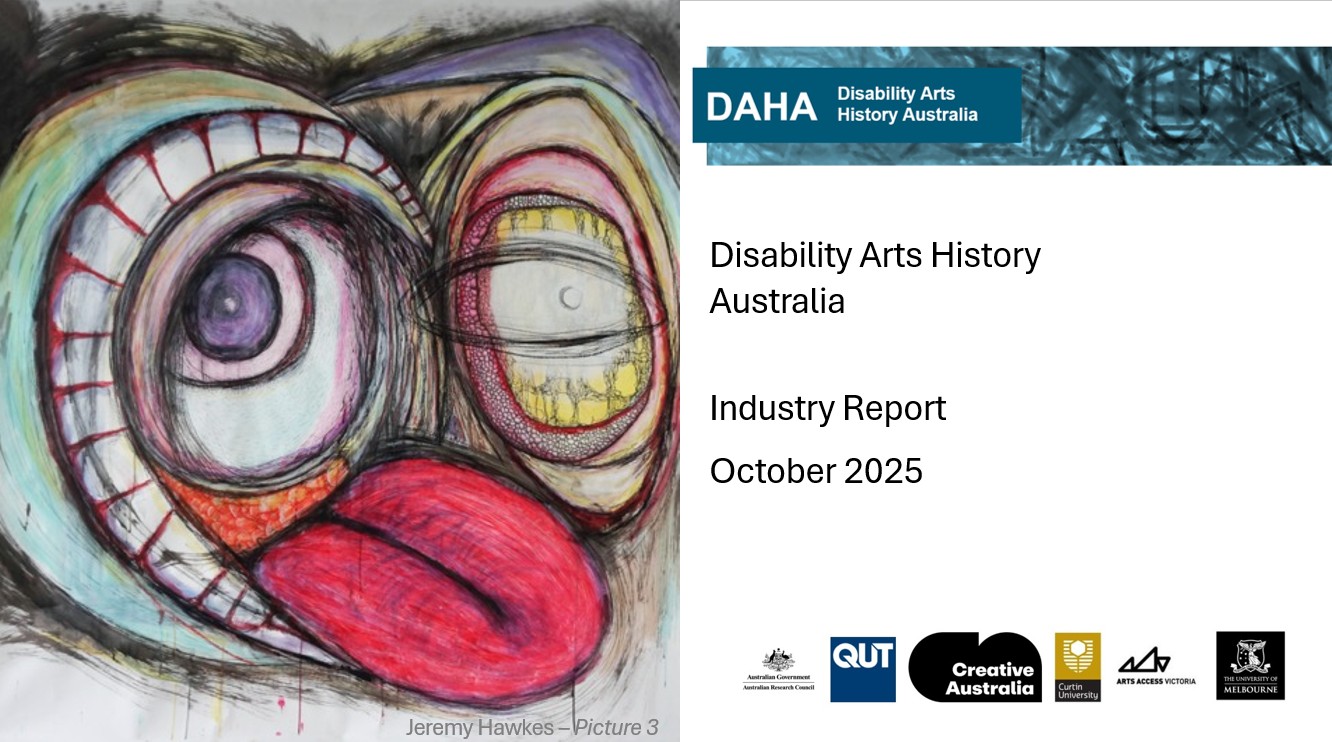 Disability Arts History Australia Launch 2025 - Industry Report
Disability Arts History Australia Launch 2025 - Industry Report -
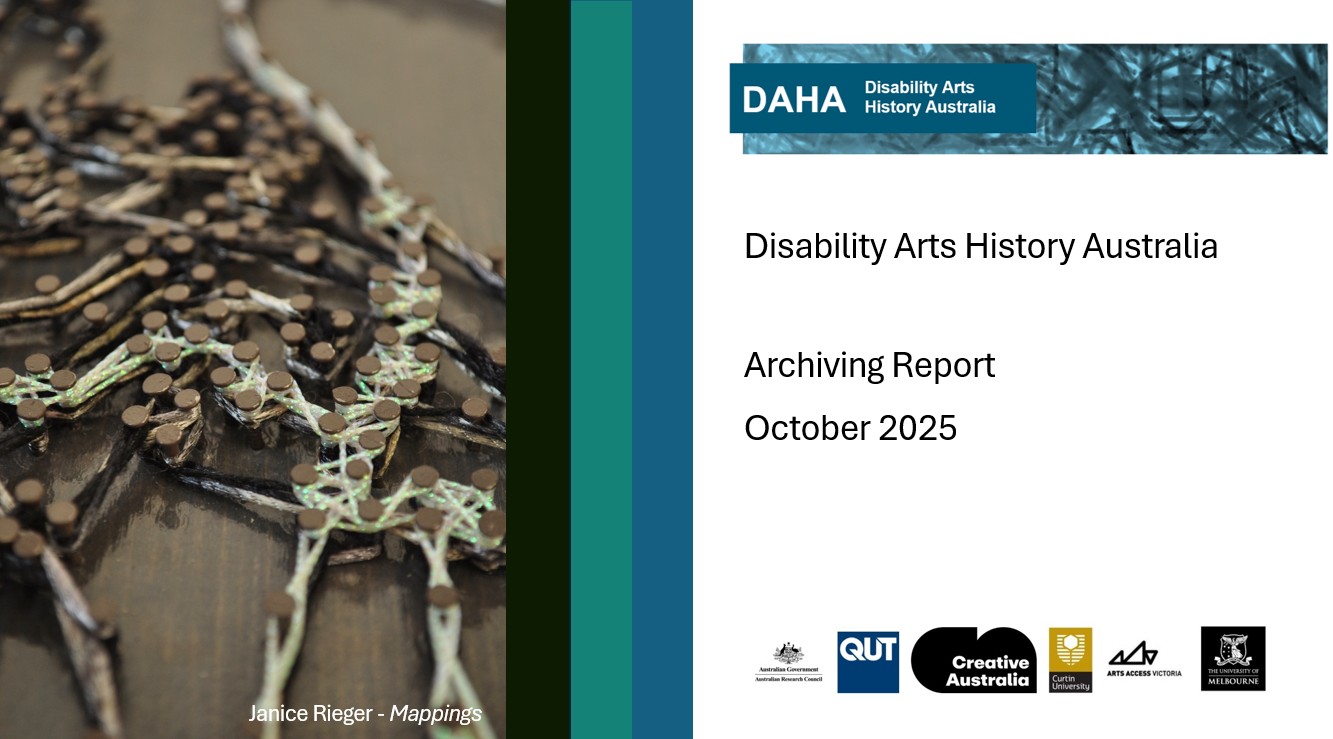 Disability Arts History Australia Launch 2025 - Archiving Report
Disability Arts History Australia Launch 2025 - Archiving Report -
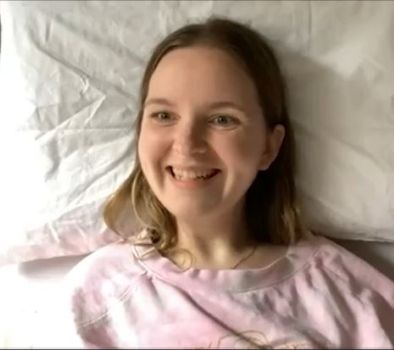 "Interview with Jess Cochran" Jess Cochran (they/them) is an actor, model, writer and disability advocate. Interview Summary: Jess Cochran is a queer, non-binary, neurodivergent, performing artist, advocate, writer, and consumer consultant with a background in both physical and psychosocial disabilities. Their journey into the performing arts began accidentally with a role in the Awards winning Melbourne Fringe Festival production, Qualia, which opened doors to more local and international Awards-winning work in film and stage. Jess identifies proudly with their disabilities and considers their art both a personal expression and a political act aimed at highlighting the issues faced by the disability community. Jess’s work spans across writing, modelling, and various performance arts, and they wish to see an increase of disability arts representation in mainstream media with authentic casting, opportunities and improved accessibility for disabled performers. Jess is also passionate about highlighting intersectionality in disability arts.
"Interview with Jess Cochran" Jess Cochran (they/them) is an actor, model, writer and disability advocate. Interview Summary: Jess Cochran is a queer, non-binary, neurodivergent, performing artist, advocate, writer, and consumer consultant with a background in both physical and psychosocial disabilities. Their journey into the performing arts began accidentally with a role in the Awards winning Melbourne Fringe Festival production, Qualia, which opened doors to more local and international Awards-winning work in film and stage. Jess identifies proudly with their disabilities and considers their art both a personal expression and a political act aimed at highlighting the issues faced by the disability community. Jess’s work spans across writing, modelling, and various performance arts, and they wish to see an increase of disability arts representation in mainstream media with authentic casting, opportunities and improved accessibility for disabled performers. Jess is also passionate about highlighting intersectionality in disability arts. - National Association of Visual Arts (NAVA)
-
“Carriageworks ‘New Normal’ program plan to commission ten new works presents three performances - Lady Eats Apple (Back to Back Theatre, 2017), Off the Record (Force Majeure, Dance Integrated Australia, 2016), Simple Infinity (Urban Theatre Projects, 2016)" New Normal is Carriageworks “national strategy for the development of disability arts practice.” Carriageworks state an aim to “commission ten new major works across contemporary performance, music, dance and visual arts.” As part of the program, Back to Back Theatres’ Lady Eats Apple (2017), Force Majeure and Dance Integrated Australia’s Off the Record (2016), and Urban Theatre Projects’ Simple Infinity (2016) each presented at Carriageworks. Since then, there has been no update on Carriageworks’ goal, suggesting the program may have fallen short of its initial objectives.
- Sue MacDonald
- Michelle Ryan
-
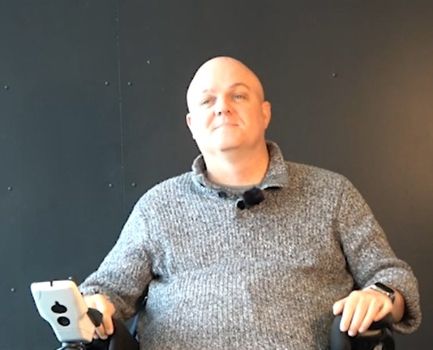 "Interview with Tim McCallum" Tim McCallum is a singer, performer and speaker and disability advocate. Interview Summary Tim McCallum is a performer who specializes in singing and acting, with singing being his foremost talent. Having sustained a spinal cord injury resulting in quadriplegia before beginning his studies at the Western Australian Academy of Performing Arts, Tim's childhood passion for the performing arts has continued to motivate his career. Through his experiences, both positive and negative, regarding inclusion and discrimination in the arts, Tim has become determined to challenge preconceived notions and make disability a visible and celebrated aspect of performance. He is a strong advocate for the representation of artists with disabilities in leadership roles within arts governance, stressing the importance of lived expertise over tokenism for lasting change in the industry.
"Interview with Tim McCallum" Tim McCallum is a singer, performer and speaker and disability advocate. Interview Summary Tim McCallum is a performer who specializes in singing and acting, with singing being his foremost talent. Having sustained a spinal cord injury resulting in quadriplegia before beginning his studies at the Western Australian Academy of Performing Arts, Tim's childhood passion for the performing arts has continued to motivate his career. Through his experiences, both positive and negative, regarding inclusion and discrimination in the arts, Tim has become determined to challenge preconceived notions and make disability a visible and celebrated aspect of performance. He is a strong advocate for the representation of artists with disabilities in leadership roles within arts governance, stressing the importance of lived expertise over tokenism for lasting change in the industry. - Daniel Savage
-
"Cultural Ministers Council (2009) National Arts & Disability Strategy." Reads, in part "On 9 October 2009, the Cultural Ministers Council agreed to the National Arts and Disability Strategy, which sets out a vision for improving access and participation in the artistic and cultural activities for people with disabilities. The Strategy provides a framework within which jurisdictions can assess and improve existing activities. It also identifies new priority projects that could be progressed as national initiatives or by individual jurisdictions."
-
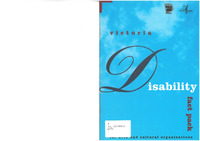 "Victoria : disability fact pack for arts and cultural organisations - DADAA National Network and Australia Council (1998)" Disability fact pack for arts and cultural cultural organisations in Victoria
"Victoria : disability fact pack for arts and cultural organisations - DADAA National Network and Australia Council (1998)" Disability fact pack for arts and cultural cultural organisations in Victoria - Jodee Mundy
-
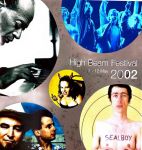 "High Beam Festival Program 2002" High Beam Festival Program 2002 reads "Welcome to High Beam 2002 Australia's international arts and disability festival, celebrating disability culture from around the globe. In our third biennial festival we explore the significance of the circle. In High Beam Festival 2002, that significance is represented through our international program, 'circular' Wheelie BIG Event, the online community of Tech Arts Express and over 40 companies, performers and community members who span the arts and the globe. High Beam is about showing that living with a disability does not exclude you from creating real, exciting, cutting edge art. High Beam is also about showing what it is like to live with a disability through the medium of art. Get out there and enjoy! We are thrilled to present Australia's own legendary pianist David Helfgott, UK comedian Mat Fraser, the amazing wheelchair dancers from Nepal as well as Belinda Mason - Lovering's Intimate Encounters - a landmark photo-graphic exhibition from Australia."
"High Beam Festival Program 2002" High Beam Festival Program 2002 reads "Welcome to High Beam 2002 Australia's international arts and disability festival, celebrating disability culture from around the globe. In our third biennial festival we explore the significance of the circle. In High Beam Festival 2002, that significance is represented through our international program, 'circular' Wheelie BIG Event, the online community of Tech Arts Express and over 40 companies, performers and community members who span the arts and the globe. High Beam is about showing that living with a disability does not exclude you from creating real, exciting, cutting edge art. High Beam is also about showing what it is like to live with a disability through the medium of art. Get out there and enjoy! We are thrilled to present Australia's own legendary pianist David Helfgott, UK comedian Mat Fraser, the amazing wheelchair dancers from Nepal as well as Belinda Mason - Lovering's Intimate Encounters - a landmark photo-graphic exhibition from Australia." -
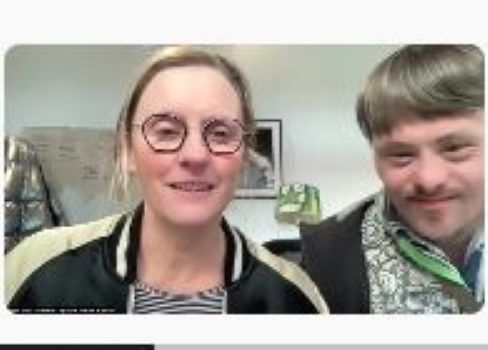 "Interview with Luke Cambpell and Kelly Drummond Cawthon" Luke Campbell is a theatre performer, writer and director and has been with Second Echo since 2015. Interview Summary In the interview Luke Campbell and Kelly Drummond Cawthon from Second Echo Ensemble share insights into their creative processes and the significance of their work. Luke, a core artist for the ensemble, emphasizes the role of deep listening and communication in his art, comparing his work to a meditative exploration of sound and connection, akin to the themes in the movie "Avatar." Kelly, as the ensemble's creative director, highlights the importance of presenting their work across diverse platforms to reach broader audiences and foster inclusive discussions. Throughout the conversation, they express views on the challenges and perceptions surrounding disability arts, advocating for recognition of diverse voices and stories in the arts community.
"Interview with Luke Cambpell and Kelly Drummond Cawthon" Luke Campbell is a theatre performer, writer and director and has been with Second Echo since 2015. Interview Summary In the interview Luke Campbell and Kelly Drummond Cawthon from Second Echo Ensemble share insights into their creative processes and the significance of their work. Luke, a core artist for the ensemble, emphasizes the role of deep listening and communication in his art, comparing his work to a meditative exploration of sound and connection, akin to the themes in the movie "Avatar." Kelly, as the ensemble's creative director, highlights the importance of presenting their work across diverse platforms to reach broader audiences and foster inclusive discussions. Throughout the conversation, they express views on the challenges and perceptions surrounding disability arts, advocating for recognition of diverse voices and stories in the arts community. -
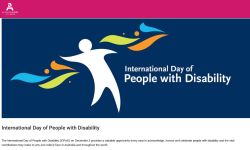 "Accessible Arts - International Day of People With Disability, captured 2022" Accessible Arts - International Day of People With Disability - reads, in part "The International Day of People with Disability (IDPwD) on December 3 provides a valuable opportunity every year to acknowledge, honour and celebrate people with disability and the vital contributions they make to arts and culture here in Australia and throughout the world."
"Accessible Arts - International Day of People With Disability, captured 2022" Accessible Arts - International Day of People With Disability - reads, in part "The International Day of People with Disability (IDPwD) on December 3 provides a valuable opportunity every year to acknowledge, honour and celebrate people with disability and the vital contributions they make to arts and culture here in Australia and throughout the world." -
“Arts Access Australia launches its ‘Don’t Play Us, Pay Us’ campaign in response to 'cripping up'” In 2012, Arts Access Australia launched its ‘Don’t Play Us, Pay Us’ campaign in response to 'cripping up,' where non-disabled performers play disabled characters on stage or screen.
- Meeting Place Arts and Disability Forum
-
“The Asia-Pacific Wataboshi festival comes to Brisbane” Hosted by Arts Access Qld, in 2003, the Asia-Pacific Wataboshi festival was brought to Brisbane with the aim to raise the profile of disability arts. David Helfgott was the ambassador.
-
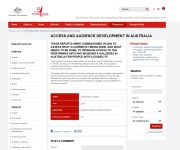 "Australia Council - Access and audience development in Australia" Australia Council - 'Access and audience development in Australia' reports - reads, in part "These reports were commissioned in 2004 to assess what is currently being done, and what needs to be done, to increase access to the performing arts and museums & galleries in Australia for people with a disability."
"Australia Council - Access and audience development in Australia" Australia Council - 'Access and audience development in Australia' reports - reads, in part "These reports were commissioned in 2004 to assess what is currently being done, and what needs to be done, to increase access to the performing arts and museums & galleries in Australia for people with a disability." - Susan Maley
- Susan Paxton
- Sue Paxton
- Rick Randall
- Richard Randall
